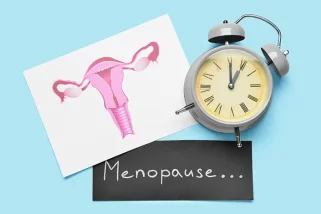Overview
Menopause marks a significant phase in a woman’s life symbolizing the end of her reproduction years. This natural biological process typically unfolds in a woman’s late 40s or early 50s , characterized by the cessation of menstrual periods for twelve consecutive months.

It’s a time of transition, bringing about various physical and emotional changes as the body adjusts to decreasing levels of estrogen and progesterone. Understanding menopause is crucial for navigating this period with grace and knowledge, empowering women to manage their health and well-being proactively. [1]
What is Manopause?
Menopause is defined as the point in time when menstrual cycles permanently cease due to the natural depletion of ovarian oocytes from aging. The diagnosis is typically made after a woman has gone without a menstrual period for 12 consecutive months. It signifies the end of fertility and is a natural part of a woman’s life cycle, not a disease or a disorder. [2]
Menopause can also be induced by surgical removal of the ovaries or damage to the ovaries through medical treatments such as chemotherapy. The transition to this stage of life, known as perimenopause, varies among women and involves significant changes in hormone levels, especially estrogen and progesterone, which can affect many aspects of a woman’s health and well-being.
Telling about the causes of menopause, Nancy Mitchell, Registered Nurse says that there is only one known cause for menopause, and that’s the cessation of a woman’s menstrual cycle. The menstrual cycle depends on balanced sex hormone levels to continue each month. However, permanent hormonal fluctuations and imbalances, especially with the hormone estrogen cause the cycle to stop running.
Hormonal Changes and Menopause
Hormonal changes during menopause signify the end of a woman’s reproductive years. Declining estrogen levels lead to symptoms like hot flashes, mood swings, and vaginal dryness. While menopause is a natural process, it can impact quality of life and increase the risk of osteoporosis and heart disease. Managing symptoms through hormone replacement therapy, lifestyle adjustments, and emotional support can help women navigate this transition with resilience and embrace the next phase of life. [3]
1. Estrogen Decline
Estrogen levels dramatically decrease during menopause, leading to the most common symptoms such as hot flashes, night sweats, vaginal dryness, and mood swings. Estrogen plays a crucial role in regulating the menstrual cycle and affects many parts of the body, including the heart, bones, and skin.
2. Progesterone Changes
Alongside estrogen, progesterone levels also fall. This hormone is involved in preparing the body for pregnancy each month. Its decline is primarily associated with the cessation of ovulation and irregular menstrual cycles during perimenopause.
3.Testosterone Levels
While often considered a male hormone, testosterone is present in women and decreases with age. A decrease in testosterone can impact libido, mood, and energy levels. [4]
4. FSH and LH Fluctuations
Follicle-stimulating hormone (FSH) and luteinizing hormone (LH) levels rise as the ovaries become less responsive. High levels of FSH and LH coupled with low levels of estrogen and progesterone are indicative of menopause.
5. Impact on Bone Density
The decline in estrogen is directly linked to a decrease in bone density, increasing the risk of osteoporosis. Estrogen helps in maintaining bone mass, and without it, women can lose bone density rapidly. [5]
6. Cardiovascular Risks Increase
Estrogen affects the health of the cardiovascular system, and its decline can increase the risk of heart disease. This underlines the importance of monitoring heart health closely during and after the transition into menopause.
Impact of Menopause on Women’s Health
The impact of menopause on a woman’s health extends beyond hormonal fluctuations, entailing significant physiological and psychological transformations. These changes can lead to a diverse range of symptoms, including hot flashes, mood swings, and sleep disturbances, which may affect daily life and overall well-being.
Furthermore, the decreased bone density and increased cardiovascular risks associated with hormonal changes emphasize the need for targeted health strategies. Adopting a holistic approach to lifestyle, incorporating regular exercise, a balanced diet, and, when necessary, medical interventions, can mitigate these risks. Awareness and proactive management of menopause symptoms can greatly influence the quality of life during this pivotal stage. [5]
1. Decrease in Bone Density
Menopause brings a decline in estrogen levels, which is associated with an increased risk of osteoporosis. Decreased bone density can lead to fractures and other bone-related issues, emphasizing the importance of bone health during and after menopause. [6]
2. Effects on Cardiovascular Health
Estrogen plays a protective role in cardiovascular health by maintaining healthy blood vessel function. With estrogen levels declining during menopause, women become more susceptible to heart disease and other cardiovascular conditions. Managing cardiovascular risk factors, such as high blood pressure and cholesterol, becomes crucial during this stage of life. [7]
3. Genitourinary Fall
The decrease in estrogen levels during menopause can lead to changes in the genitourinary tract, such as vaginal dryness, urinary incontinence, and an increased risk of urinary tract infections. These symptoms can impact sexual function and overall quality of life for women transitioning through menopause.
4. Increase Metabolic levels
Hormonal changes during menopause can also affect metabolic health, leading to weight gain, particularly around the abdomen. This shift in fat distribution increases the risk of metabolic syndrome, insulin resistance, and type 2 diabetes. Maintaining a healthy weight through diet and exercise is essential for managing metabolic health during menopause.
5. Mental peace
Menopause can have a significant impact on women’s mental health, contributing to symptoms such as mood swings, irritability, anxiety, and depression. Hormonal fluctuations, coupled with life changes associated with aging, can exacerbate these symptoms. Seeking support from mental health professionals and implementing self-care strategies are vital for preserving mental well-being during menopause. [8]
6. Problems in Cognitive Functions
Some research suggests that menopause may also influence cognitive function, including memory, attention, and executive function. Estrogen has neuroprotective effects on the brain, and its decline during menopause may contribute to cognitive changes. However, further research is needed to fully understand the relationship between menopause and cognitive health. [9]
7. Risk of Breast Cancer
Estrogen levels play a role in breast tissue density and breast cancer risk. While the risk of breast cancer increases with age, the relationship between menopause and breast cancer risk is complex and influenced by various factors. Regular breast screenings and mammograms remain essential for early detection and prevention.
How to treat menopause?
1. Hormone Replacement Therapy (HRT)
HRT can be effective in alleviating hot flashes, night sweats, and vaginal discomfort. It involves taking medications containing female hormones to replace the ones the body no longer makes after menopause.
2. Lifestyle Changes
Incorporating regular physical activity, maintaining a healthy diet, reducing caffeine and alcohol intake, and quitting smoking can help manage menopausal symptoms.
3. Calcium and Vitamin D Supplements
To counteract the loss of bone density, calcium and vitamin D supplements can be beneficial. These nutrients help strengthen bones and reduce the risk of osteoporosis.
4. Stress Reduction Techniques
Mindfulness, yoga, and meditation can alleviate stress and improve mood swings and sleep disturbances.
5. Non-Hormonal Medications
For those who cannot or choose not to use HRT, non-hormonal medications like selective serotonin reuptake inhibitors (SSRIs) may help relieve hot flashes and mood swings.
6. Regular Health Screenings
Since menopause increases the risk of certain health conditions, regular screenings for heart health, bone density, and breast cancer are crucial.
7. Education and Support
Joining support groups or seeking counseling can provide emotional support and practical advice on managing menopause symptoms.
Conclusion
Menopause is a natural and significant phase in a woman’s life that brings about a multitude of changes, both physical and emotional. Although it may present various challenges, understanding and approaching these changes with effective strategies and treatments can significantly ease the transition. By incorporating a combination of medical advice, lifestyle modifications, emotional support, and regular health screenings, women can navigate through menopause more comfortably. It’s about adapting to new norms of health and well-being, fostering a supportive community, and maintaining open lines of communication with healthcare providers. With the right tools and resources, menopause can be a period of empowerment and renewal, offering an opportunity to focus on personal health and prioritize well-being.
9 Sources
We review published medical research in respected scientific journals to arrive at our conclusions about a product or health topic. This ensures the highest standard of scientific accuracy.
[1] Peacock, Kimberly, et al. "StatPearls [Internet]." Menopause. StatPearls Publishing, 21 Dec. 2023, www.ncbi.nlm.nih.gov/books/NBK507826.[2] Verdonk P, Bendien E, Appelman Y. Menopause and work: A narrative literature review about menopause, work and health. Work. 2022;72(2):483-496. doi: 10.3233/WOR-205214. PMID: 35570508; PMCID: PMC9277682.
[3] Hoga L, Rodolpho J, Gonçalves B, Quirino B. Women's experience of menopause: a systematic review of qualitative evidence. JBI Database System Rev Implement Rep. 2015 Sep 16;13(8):250-337. doi: 10.11124/jbisrir-2015-1948. PMID: 26455946.
[4] "Research explores the impact of menopause on women’s health and aging." National Institute on Aging, 15 Apr. 2024, www.nia.nih.gov/news/research-explores-impact-menopause-womens-health-and-aging.
[5] Santoro N, Roeca C, Peters BA, Neal-Perry G. The Menopause Transition: Signs, Symptoms, and Management Options. J Clin Endocrinol Metab. 2021 Jan 1;106(1):1-15. doi: 10.1210/clinem/dgaa764. PMID: 33095879.
[6] Whiteley J, DiBonaventura Md, Wagner JS, Alvir J, Shah S. The impact of menopausal symptoms on quality of life, productivity, and economic outcomes. J Womens Health (Larchmt). 2013 Nov;22(11):983-90. doi: 10.1089/jwh.2012.3719. Epub 2013 Oct 1. PMID: 24083674; PMCID: PMC3820128.
[7] Rostami-Moez M, Masoumi SZ, Otogara M, Farahani F, Alimohammadi S, Oshvandi K. Examining the Health-Related Needs of Females during Menopause: A Systematic Review Study. J Menopausal Med. 2023 Apr;29(1):1-20. doi: 10.6118/jmm.22033. PMID: 37160298; PMCID: PMC10183767.
[8] "Can Menopause Cause Depression?" 9 Jan. 2024, www.hopkinsmedicine.org/health/wellness-and-prevention/can-menopause-cause-depression.
[9] Baral S, Kaphle HP. Health-related quality of life among menopausal women: A cross-sectional study from Pokhara, Nepal. PLoS One. 2023 Jan 20;18(1):e0280632. doi: 10.1371/journal.pone.0280632. PMID: 36662806; PMCID: PMC9858775.








 This article changed my life!
This article changed my life! This article was informative.
This article was informative. I have a medical question.
I have a medical question.
 This article contains incorrect information.
This article contains incorrect information. This article doesn’t have the information I’m looking for.
This article doesn’t have the information I’m looking for.
